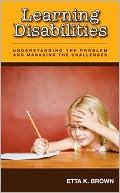Monday, February 15, 2010
Special Education Defined
Special education is largely defined by the federal Individuals with Disabilities Education Act, or the IDEA, which guarantees a “free, appropriate public education” to children with disabilities and mandates that, to the “maximum extent appropriate,” they be educated with their non-disabled peers in the “least restrictive environment.”
The term refers to all the “special” individualized help required by those children who do not learn well with traditional teaching methods. If the child’s problem is identified early enough, they benefit greatly from the special services provided to help them achieve.
How Services Are To Be Delivered
These special services should be provided to the child in his regular classroom whenever possible. The child should not be removed from the classroom for services unless they cannot be provided in the regular classroom. When special individualized services are required, the child may leave the classroom to receive then, and return to the classroom.
Interventions outside the classroom may be provided by a number of professional service providers including a special education teacher, a speech and language therapist, an occupational therapist, or other professional as needed.
These services are the ingredients that determine the appropriateness of your child’s education. All interactions with the child are coordinated with the classroom teacher, and the parent is informed at all stages of the process.
The Process of Special Education
The process begins with a referral from the classroom teacher to a team comprised of the child’s teacher, the parent, the building administrator and the school psychologist. Others may attend by invitation from the parent.
At this meeting, the team looks at the child’s behavior, his achievement, and any other information which the team deems necessary to determine whether he should be referred for an assessment and whether he would benefit from special education services.
If the team decides an assessment would provide needed information, the parent is asked to give permission for the assessment by signing an assessment plan. The assessment plan outlines the nature of the assessment the child is to receive including all the tests that will be administered; what they measure and which professional will administer them. When the assessment is completed, the team meets again to review the results.
The Individualized Education Plan (IEP)
If the child is eligible, the team will design an individualized education plan outlining goals and objectives for the child’s education. If the parents agree to the plan, their signature and the signature of all the team members obligates the school district to provide the child with all the services on the plan.
The IEP is reviewed every year, and the child receives a complete reevaluation every three years, and when indicated, the plan is modified, or completely redesigned.
Tuesday, February 9, 2010
Unique new advocacy service to parents of children with learning problems
The introductory statement, “So you have been informed that your child has a learning disability, Now What?” explains where they begin their support of parents seeking their services. Etta Brown, the director, says that the high rate of unemployment is the reason why services are so affordable or, as is most often the case, free of charge.
Reason for the service
The psychologist providing services say that the law Title IV, No Child Left Behind is their motivation for being involved. Originally signed into law in 2002, the 1997 amendments were signed into law on June 5, 1997.
The law states, “The purpose of Title IV (No Child Left Behind) is to promote parental choice… Parents armed with data, are the best forces of accountability in education. And parents, armed with options and choice, can assure that their children get the best, most effective education possible.”
Parents not prepared for delegated responsibilities
To acquire all this skills needed to be effective in this new role would take the equivalent of a four-year college education. And if you are like most parents who are working and trying to raise a family, you just don’t have time to research the data needed to knowledgeably advocate for your child’s education.
Why the retirees coach parents
The lack of parent preparation is the reason why the retirees at Ceres Psychological Services have returned to the process to coach parents. Meetings at school can be intimidating, and schools sometimes unintentionally deny parents their rights.
Parents who have received the services of these retirees state that they feel more confident in meetings, and can better represent their child because they know their rights under the law, and have learned how to express their concerns.
Services available nationally
Parent coaches are available to all 52 states. The service works because it is advising on Federal law and the coaches, therefore, are not limited to a particular State or geographical area.
Services are provided by fax, phone, or email so it is readily available at no cost to the parent. The organization is supported by the sale of their book Learning Disabilities: Understanding the Problem, Managing the Challenges and the book is reasonably priced in printed or e-book form.
The retired psychologists have an international following of parents, teachers, administrators, and graduate students who find their services and willingness to answer questions and share information invaluable.
